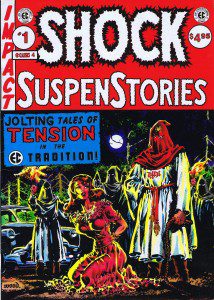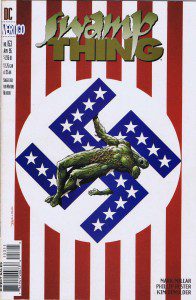 In my last column I suggested that there might be a link between declining sales in comics and the rise in status of the newly respectable ‘graphic novel’. The comic is no longer a throwaway item aimed at sub-literate degenerates, it’s a recognised artistic medium and a tool for encouraging youngsters to read. As a result of this (and no other, far more reasonable, explanations) comic sales have fallen off a cliff.
In my last column I suggested that there might be a link between declining sales in comics and the rise in status of the newly respectable ‘graphic novel’. The comic is no longer a throwaway item aimed at sub-literate degenerates, it’s a recognised artistic medium and a tool for encouraging youngsters to read. As a result of this (and no other, far more reasonable, explanations) comic sales have fallen off a cliff.
You can prove anything with ‘facts’
Although this argument is slightly undermined by the fact that comic sales actually rose this year, for the first time in four years, lets not let a simple thing like facts get in the way of a good argument. As the noted sage Homer Simpson once said: “Oh yeah, ‘facts’, you can prove anything with ‘facts’.”
It was my assertion that we need to make comic disreputable again, especially horror comics. Nothing boosts sales like a good moral panic and a few mothers tearing their hair out shrieking: “Think of the children. Why won’t anyone think of the children”. It worked for video nasties didn’t it? Well okay, it didn’t quite ‘work’ for video nasties (unless you count getting all your stock seized by customs and withdrawn from sales as ‘working’). But as I said, lets not bring facts into this now that I’m on a roll.
Horror comics are already swimming in violence and sublimated sexuality so it won’t be too hard to stir up a bit of public indignation about them. Especially if we throw in those two taboo topics, that must never be mentioned at the dinner table, namely Politics and Religion.
Political Horror
You might think that a supposedly escapist genre like horror is a poor vehicle for serious political thought, particularly when that horror comes in comic form. However I would beg to disagree. Horror comics have a long history of tackling controversial political topics head on.
EC comics, long recognised as being some of the best horror comics in the history of the medium, were never afraid to take on hot political topics. They often ran what the readers referred to as ‘Preachies’. These were hard hitting stories like ‘Under Cover’ and ‘Guilty’ that confronted social issues like racial hatred, political corruption, miscegenation and the Ku Klux Klan. It would be brave to print these stories today, but given that they came out in the middle of McCarthyism, when the threat of repression and retribution was all too prevalent, they’re a testament to the courage and conviction of writers like Al Feldstein, artists like Wally Wood and publishers like the late, great William M. Gaines.
EC weren’t alone in publishing horror stories with social concern, but their stance undoubtedly helped to put their horror comics out of business when the Comics Code Authority cracked down in the late fifties. When publisher James Warren reanimated what had been the once rotting corpse of horror comics in the mid sixties with the magazines Creepy, Eerie and Vampirella, he too was unafraid to let his writers and artists produce political stories.
Writer and editor Archie Goodwin succeeded in having Warren magazines banned from all US Army bases because of his stories about the Vietnam war. These were published at a time when no-one else in the film, TV or publishing industries would dare tackle the subject. Other writers like T Casey Brennan, Bill DuBay and Bruce Jones soon picked up the torch and Warren Comics continued to publish controversial stories right up to their demise in 1983.
 It was around this time that writer Alan Moore joined artists Steve Bissette and John Totleben for a legendary run on Swamp Thing, the DC horror comic created by Len Wein and Bernie Wrightson. Moore, Bissette and Totleben introduced a host of adult themes into their work and explored many social issues that opened the way for other writers like Jaimie Delano, Pete Milligan, Grant Morrison and Garth Ennis to explore them further. They were so successful in fact that DC editor Karen Berger was able to convince her employers to launch a whole new imprint called Vertigo which continues to publish horror fiction (among a lot of other stuff) to this day and much of it, like the excellent work of Mike Carey (Lucifer, The Unwritten) is unafraid to tackle political themes.
It was around this time that writer Alan Moore joined artists Steve Bissette and John Totleben for a legendary run on Swamp Thing, the DC horror comic created by Len Wein and Bernie Wrightson. Moore, Bissette and Totleben introduced a host of adult themes into their work and explored many social issues that opened the way for other writers like Jaimie Delano, Pete Milligan, Grant Morrison and Garth Ennis to explore them further. They were so successful in fact that DC editor Karen Berger was able to convince her employers to launch a whole new imprint called Vertigo which continues to publish horror fiction (among a lot of other stuff) to this day and much of it, like the excellent work of Mike Carey (Lucifer, The Unwritten) is unafraid to tackle political themes.
There are of course a huge number of great artists and publications I’ve missed out in this whistle stop tour of the last sixty odd years of horror comics and I apologise to all those indignant readers who are already sharpening a stake with my name on it. However I think I’ve made my point that Horror comics have a long tradition of rocking the boat and stirring up public indignation over political issues.
Using trashy to our advantage
The reasons for this are two fold I think. The first is that horror in general, and horror comics in particular, have always been seen as something of a suspect and illegitimate genre, about a rung and a half above pornography (if that). This ‘trashy’ status has allowed horror comics to fly below the radar for much of the last fifty years and, while those of us working in the field might like a little more official recognition, it has granted the creators an extraordinary license.
The second is that Horror is the ideal fiction to explore the political divisions that threaten our current stability. Horror has always been a way of facing up to those things in our society that are barely faceable, of confronting taboos and saying the things no-one wants to say about the human condition. It works best when it’s about far more than just the fear of death or the threat of a monster.
Today, when the political outlook is bleaker than it’s been in a generation, as the world economy tanks and the EU threatens to implode and take the rest of the globe with it, what other medium is better placed confront these issues? (As a completely irrelevant aside, is it just me, or would most of us in Europe be happier about being part of the EU if it didn’t sound like something you’d say when you’ve just trod on an eyeball? “Eeee-yooo!”)
The prestigious literary establishment certainly doesn’t want the job. Literary author John Lanchester told Zoe Williams in an article in the Guardian recently that: “In general, the literary novel has turned slightly too far away from the things that press on people. It is an utterly bizarre place to have ended up, but if the subject of a novel is too interesting, that’s not literary enough.”
It would seem then, that the task of saying what no-one else dares to say (but desperately wants to) falls to those of us grubbing about in the dirty little world of four colour fears. We have the means and the best medium to do just this and, lets face it, we were never in any danger of being considered ‘literary enough’.
So brothers and sisters of horror comics, consider this a call to ‘severed’ arms. Forget Wall Street, let’s grab our pencils, brushes and laptops and go occupy the nearest cemetery.
JASPER BARK
If you enjoyed Jasper Bark’s column, please consider clicking through to our Amazon Affiliate links and buying some of his fiction. If you do you’ll help keep the This Is Horror ship afloat with some very welcome remuneration.









